Local governments must use the funds to combat the fentanyl and opioid crisis
SEATTLE — Attorney General Bob Ferguson announced today that city and county governments in Washington state received more than $55 million this month in the latest payments from Ferguson’s litigation against companies that fueled the opioid crisis. The funds must be used to combat the opioid epidemic.
The funds come from resolutions with opioid distributors AmerisourceBergen, Cardinal Health and McKesson, opioid manufacturers Allergan and Teva and national pharmacy chains CVS, Walgreens and Walmart. A bulk of the March funds came from a one-time payment from Walmart.
The funding for cities and counties amounts to half of the companies’ approximate $110.3 million payment to Washington state this month. The state Legislature received the other half of the funding, which it used to fund additional opioid remediation efforts.
Washingtonians can use this chart to see what their local government will receive as a result of the Attorney General’s litigation to combat the opioid epidemic.
“Communities on the frontlines of the opioid and fentanyl epidemic have an urgent need for resources,” Ferguson said. “I fought to ensure hundreds of millions more dollars get to those communities. This money will improve treatment options, support first responders and invest in other proven strategies to combat the epidemic.”
This year the Legislature appropriated the state’s half of the nine-figure Johnson & Johnson recovery, including significant investments to increase access to opioid medication, assist tribal governments’ efforts to combat the fentanyl epidemic, support first responders and educate youth. Highlights include:
Buprenorphine (reduces opioid withdrawal symptoms)
- $3,000,000 provided for the Health Care Authority to increase access to long-acting injectable buprenorphine products.
- $1,500,000 provided for the Health Care Authority to establish high-intensity community-based teams serving people with opioid use disorder. The funding must be used to significantly increase administration of long-acting injectable buprenorphine to people at highest risk for overdose.
Tribal governments
- $750,000 provided for support of tribal fentanyl summits in fiscal years 2024 and 2025.
- $2,000,000 provided for a tribal opioid prevention campaign to inform and educate tribal communities about opioid misuse prevention, overdose response and treatment.
First Responders
- $1,250,000 provided for the Department of Health to purchase a dedicated supply of naloxone for first responders across the state.
- $400,000 provided to increase support for emergency medical services and fire departments in their opioid overdose prevention efforts, including naloxone leave-behind programs, overdose response communications and staffing costs for community-based paramedics serving as navigators for education, resource and follow-up supports.
Prevention and Education
- $2,000,000 provided for the Department of Health to administer grants to local health jurisdictions for opioid and fentanyl awareness, prevention and education campaigns.
Overall so far, the Washington Attorney General’s Office has recovered more than $1.2 billion for Washington to address the fentanyl and opioid crisis.
Ferguson has now rejected national resolutions with five corporations, netting Washington approximately $200 million more resources for improved treatment options, funding for first responders and other proven strategies to address the epidemic.
In 2022, Ferguson reached a resolution, pending bankruptcy court approval, requiring Purdue Pharma to pay $183 million to Washington — $113 million more than the national deal. Also in 2022, Ferguson’s case against the three largest opioid distributors — McKesson Corp., Cardinal Health Inc. and AmerisourceBergen Drug Corp. — led to a $518 million resolution. That was $46 million more than the national resolution promised.
The Attorney General’s Office still has pending litigation against multiple national pharmacy chains that also helped fuel the epidemic.
